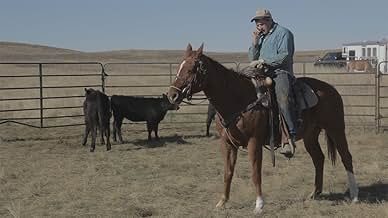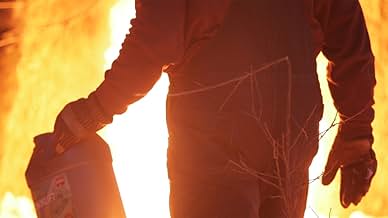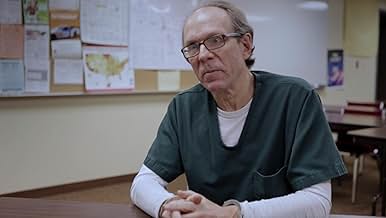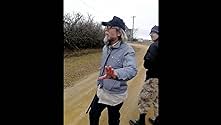AVALIAÇÃO DA IMDb
6,9/10
4,6 mil
SUA AVALIAÇÃO
Adicionar um enredo no seu idiomaWhen a noted white supremacist moves into their town, the residents of Leith, North Dakota do what they can to prevent him from taking control of the municipality.When a noted white supremacist moves into their town, the residents of Leith, North Dakota do what they can to prevent him from taking control of the municipality.When a noted white supremacist moves into their town, the residents of Leith, North Dakota do what they can to prevent him from taking control of the municipality.
- Direção
- Roteiristas
- Artistas
- Prêmios
- 8 vitórias e 31 indicações no total
- Direção
- Roteiristas
- Elenco e equipe completos
- Produção, bilheteria e muito mais no IMDbPro
Avaliações em destaque
The people that made "Welcome to Leith" did a nice job of presenting a reasonably well balanced and interesting story. While they obviously didn't like the white supremacists featured in the film, they also were sure to present the complete story...warts and all.
The town of Leith is extremely tiny and located in the Dakotas. When a crazed white supremacist arrives there and starts buying up property, folks start getting concerned. When he then starts inviting in other like-minded jerks, the town starts to react...strongly. What follows is a film that consists of showing the tiny town's efforts to get rid of the supremacists and prevent them from taking over Leith. Unfortunately, when the neo-Nazis actually do something that might be illegal, some of the townsfolks manage to undo the state's case by talking out of turn...and some of these people later blame the state for the case falling apart. However, the way I saw the film I don't believe the authorities LEGALLY had much more they could do about the supremacists...and the film leaves everything in limbo. This could REALLY benefit from a follow-up to know what subsequently occurred.
As I mentioned, the people who made the film were great--they were very thorough and did a wonderful job in presenting both sides. It's not 100% satisfying to watch, however, for two reasons. First, in real life things often DON'T work out perfectly...as the film illustrates. And, Second, despite 99.9% of the viewers wanting to see these neo-Nazis die or go to prison forever, legally this wasn't possible due to Constitutionally guaranteed rights...even the right to be an evil, nasty, hateful individual! To me this isn't a bad thing...everyone deserves protection--whether or not they are nice people...though I am sure many will be angered by this. Despite its shortcomings, it does make for an interesting documentary as well as a great civics lesson.
The town of Leith is extremely tiny and located in the Dakotas. When a crazed white supremacist arrives there and starts buying up property, folks start getting concerned. When he then starts inviting in other like-minded jerks, the town starts to react...strongly. What follows is a film that consists of showing the tiny town's efforts to get rid of the supremacists and prevent them from taking over Leith. Unfortunately, when the neo-Nazis actually do something that might be illegal, some of the townsfolks manage to undo the state's case by talking out of turn...and some of these people later blame the state for the case falling apart. However, the way I saw the film I don't believe the authorities LEGALLY had much more they could do about the supremacists...and the film leaves everything in limbo. This could REALLY benefit from a follow-up to know what subsequently occurred.
As I mentioned, the people who made the film were great--they were very thorough and did a wonderful job in presenting both sides. It's not 100% satisfying to watch, however, for two reasons. First, in real life things often DON'T work out perfectly...as the film illustrates. And, Second, despite 99.9% of the viewers wanting to see these neo-Nazis die or go to prison forever, legally this wasn't possible due to Constitutionally guaranteed rights...even the right to be an evil, nasty, hateful individual! To me this isn't a bad thing...everyone deserves protection--whether or not they are nice people...though I am sure many will be angered by this. Despite its shortcomings, it does make for an interesting documentary as well as a great civics lesson.
I wish that this wasn't a documentary.
The movie overall is extremely gripping and entertaining and well-put together. The content is horrible, and I wish that the events shown in it had never happened. This has little to do with my enjoyment of the film, however. The movie was well-put together and I liked seeing all the perspectives. It seemed like the filmmakers were trying to get the audience to sympathize with the nazis, but other than that I enjoyed this movie.
The movie overall is extremely gripping and entertaining and well-put together. The content is horrible, and I wish that the events shown in it had never happened. This has little to do with my enjoyment of the film, however. The movie was well-put together and I liked seeing all the perspectives. It seemed like the filmmakers were trying to get the audience to sympathize with the nazis, but other than that I enjoyed this movie.
Excellent film, thoroughly enjoyed it. The stories including the neo nazis and people resisting was so fascinating!
This film definitely gets the conflict: a dying town receives new arrivals who they do not want. We see a lot of bad behavior, without seeing how it came about. We hear a lot about how people feel -- but not how they got there. We see a lot of things, but we don't see the causes; we can only accept what the film shows us.
In this way, "Welcome to Leith" is very much a shaped film about real people in a real event. Sympathy clearly exists for the townspeople, but we are also given good exposure to the newcomers, who present their views openly. Unexplored is how the behavior of the good townspeople is often worse than that of the prejudiced newcomers -- or is it? We don't know, but in this film we see property destruction only by one side, and it's not the newcomers.
Making issues more complicated, the arguments given by the old-timers only tangle things further; we can imagine the same arguments happening in dying white towns receiving new non-white occupants. Sure, the answer feels obvious to all of us -- but you can't argue a feeling into a legal action ... or can you?
Perhaps the filmmakers realized all this; the title alone is ironic, since clearly the town of Leith is *not* welcoming these people. But in a free democracy, property up for sale can be bought by anyone interested. What we haven't figured out how to manage, is how to balance the rights of the existing inhabitants with those of the newcomers. "Welcome to Leith" shows this problem is still very much alive -- regardless of which side of the Sold sign you're standing on
In this way, "Welcome to Leith" is very much a shaped film about real people in a real event. Sympathy clearly exists for the townspeople, but we are also given good exposure to the newcomers, who present their views openly. Unexplored is how the behavior of the good townspeople is often worse than that of the prejudiced newcomers -- or is it? We don't know, but in this film we see property destruction only by one side, and it's not the newcomers.
Making issues more complicated, the arguments given by the old-timers only tangle things further; we can imagine the same arguments happening in dying white towns receiving new non-white occupants. Sure, the answer feels obvious to all of us -- but you can't argue a feeling into a legal action ... or can you?
Perhaps the filmmakers realized all this; the title alone is ironic, since clearly the town of Leith is *not* welcoming these people. But in a free democracy, property up for sale can be bought by anyone interested. What we haven't figured out how to manage, is how to balance the rights of the existing inhabitants with those of the newcomers. "Welcome to Leith" shows this problem is still very much alive -- regardless of which side of the Sold sign you're standing on
Welcome to Leith was well-received at its showing at Austin's SXSW Film Festival. The film documents the peculiar events that occurred in 2013-2014 when a nationally-known white supremacist Craig Cobb moves to tiny Leith, North Dakota (population: 24) with a plan to buy up land and take over city government and make it into some sort of center of white supremacy. Once alerted by the Southern Poverty Law Center (SPLC) the ordinary town folks mobilize to fight back and save their town from Cobb's nefarious plan.
The odd part of the story is that Cobb's plan seems to be legal. (When he and his partner are finally arrested they almost seem to have been provoked.) There is nothing illegal about buying land and moving into a town. And the first amendment allows him to express his beliefs and fly his Nazi flags no matter how evil and offensive those beliefs may be. The town residents actually seemed to be making excuses to get rid of him such as citing him for not having running water and a sewage system on his property.
Fundamentally, the film asks the question is democracy about the community making decisions by the will of the majority or is there a basic set of minimum beliefs about human equality that are necessary prerequisites to participate in democratic society? The majority of the town seemed to decide – really quite reasonably - that Cobb's noxious beliefs were so anti-egalitarian that they didn't want him and his cronies to live in their town. They are in some sense intolerant of his intolerant beliefs, but one can hardly blame them.
Welcome to Leith is beautifully filmed and the filmmakers maintain an impressive level of objectivity about their offensive subject. They let his evil beliefs discredit themselves rather than trying to paint Cobb as anything more than the pathetic nasty creature that he is. The townspeople come off as genuine and human. Perhaps it is a positive sign that this sort of racism is unacceptable even in one of the smallest most isolated corners of the United States. I hope that Welcome to Leith gets widely distributed so that many more people can enjoy this powerful film.
The odd part of the story is that Cobb's plan seems to be legal. (When he and his partner are finally arrested they almost seem to have been provoked.) There is nothing illegal about buying land and moving into a town. And the first amendment allows him to express his beliefs and fly his Nazi flags no matter how evil and offensive those beliefs may be. The town residents actually seemed to be making excuses to get rid of him such as citing him for not having running water and a sewage system on his property.
Fundamentally, the film asks the question is democracy about the community making decisions by the will of the majority or is there a basic set of minimum beliefs about human equality that are necessary prerequisites to participate in democratic society? The majority of the town seemed to decide – really quite reasonably - that Cobb's noxious beliefs were so anti-egalitarian that they didn't want him and his cronies to live in their town. They are in some sense intolerant of his intolerant beliefs, but one can hardly blame them.
Welcome to Leith is beautifully filmed and the filmmakers maintain an impressive level of objectivity about their offensive subject. They let his evil beliefs discredit themselves rather than trying to paint Cobb as anything more than the pathetic nasty creature that he is. The townspeople come off as genuine and human. Perhaps it is a positive sign that this sort of racism is unacceptable even in one of the smallest most isolated corners of the United States. I hope that Welcome to Leith gets widely distributed so that many more people can enjoy this powerful film.
Você sabia?
- ConexõesEdited into Op-Docs: Separatist (2015)
Principais escolhas
Faça login para avaliar e ver a lista de recomendações personalizadas
- How long is Welcome to Leith?Fornecido pela Alexa
Detalhes
- Data de lançamento
- País de origem
- Central de atendimento oficial
- Idioma
- Também conhecido como
- Witajcie w Leith
- Locações de filme
- Empresas de produção
- Consulte mais créditos da empresa na IMDbPro
Bilheteria
- Faturamento bruto nos EUA e Canadá
- US$ 36.010
- Fim de semana de estreia nos EUA e Canadá
- US$ 3.707
- 13 de set. de 2015
- Faturamento bruto mundial
- US$ 36.380
- Tempo de duração
- 1 h 25 min(85 min)
- Cor
Contribua para esta página
Sugerir uma alteração ou adicionar conteúdo ausente






































